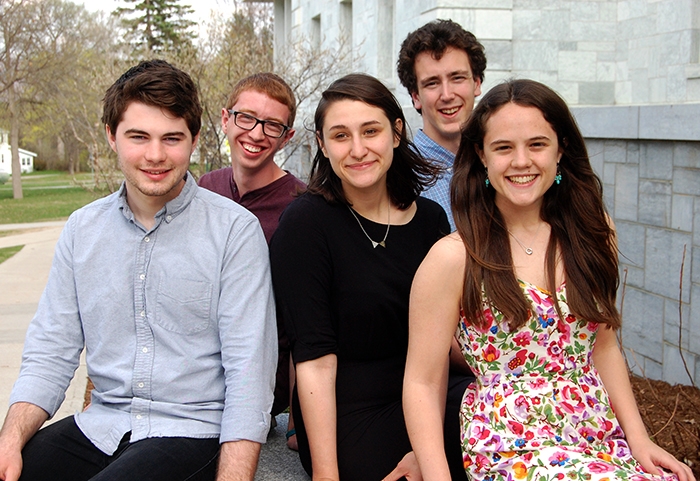College Names Kellogg Fellows in Humanities

MIDDLEBURY, Vt. – Middlebury College has announced the selection of eight students for a new undergraduate fellowship program designed to support seniors engaged in research in the humanities.
The first group of Kellogg Fellows includes a rising senior researching violence and feminine identity in modern performance art and a senior Feb studying how speakers of Portuguese in a southern Brazilian city use of the second-person pronoun.
Recipients of Kellogg Fellowships receive $5,000 to support their travel and research, which can be conducted during the summer and/or during the academic year.
The Kellogg Fellowship program at Middlebury College was established in 2014 in honor of Michael Kellogg, the husband of Lucy Pugh ’79 and father of Baird Kellogg ’10 and Camille Kellogg ’17.
The 2015-16 recipients and the titles of their projects are: Mark Balderston ’15.5, independent scholar in linguistics, “Variation in Second Person Pronoun Use in Florianopolis, Brazil”; Joshua Berlowitz ’16, classics and political science major, “Alliances, Human Nature, and Thucydides”; Benjamin Clark ’16, history major, “Removal, Resistance, and Reconstruction: William Holland Thomas and the Eastern Cherokee Indians”; and Dylan Gilbert ’16, art history and Russian major, “Thousands of Tiny Tesserae: Constructing Heaven in Sicilian Byzantine Mosaics.”
Also, Kate Hamilton ’15.5, political science major, “Founding Tensions: Liberalism and Communitarianism in the American Political Tradition”; Kyle Kysela ’16, philosophy and economics major, “Finding Ourselves in Others: Skepticism in Wittgenstein and Cavell”; Dylan Faith Otterbein ’16, art history major, “Bodies of Evidence: On Self-Violence and the Feminine Identity in Modern Performance Art”; and Tamir Williams ’16, American studies and French major, “Bette AKA Mammy, Big Momma, Madea or Others Alike: Constructions of an American Stereotype.”
The Kellogg Fellowships “are a wonderful new source of support for undergraduate research in the humanities and related areas of humanistic inquiry,” said Lisa Gates, associate dean for fellowships and research.
To qualify for a Kellogg Fellowship, projects must engage in philosophical inquiry in the humanities and areas of humanistic study, broadly defined, including but not limited to philosophy, religion, classics, history, history of art and architecture, film and media culture studies, languages, American studies, and English and American literatures.

